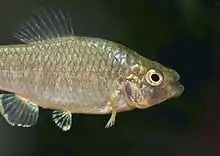
Taxonavigation
| Taxonavigation: Cyprinodontoidei |
|---|
|
Superregnum: Eukaryota |
Familia: Cyprinodontidae
Subfamilia: Cyprinodontinae
Genus: Cyprinodon
Species: Cyprinodon brontotheroides
Name
Cyprinodon brontotheroides Martin & Wainwright, 2013
Holotype: YPM ICH 025878. Paratypes: YPM ICH 025879; CAS 235268; UMMZ 249831; AMNH 258813.
Type locality: San Salvador Island, Bahamas, Crescent Pond, 1 km SE of the Gerace Research Centre, 24°06'45"N, 74°27'28"W Google Maps.
Etymology: The specific epithet brontotheroides denotes the resemblance of the unique protruding nasal region in this species to the bizarre horn-like skull appendages of the extinct odd-toed ungulate family Brontotheriidae.
References
- Martin, C.H. & Wainwright, P.C. 2013. A Remarkable Species Flock of Cyprinodon Pupfishes Endemic to San Salvador Island, Bahamas. Bulletin of the Peabody Museum of Natural History 54(2): 231–240. Reference page.